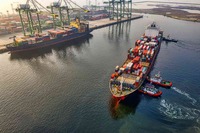Groupage refers to a shipping or transportation method where multiple small shipments from different customers are grouped or consolidated together into one larger shipment. This consolidation helps to optimize logistics and reduce costs by sharing space and resources. It is commonly used in freight forwarding and logistics to efficiently transport smaller loads without the need for a dedicated full container.
Various types of groupage or consolidation services
There are various types of groupage or consolidation services in the logistics and transportation industry, each catering to specific needs and requirements. Some common types of groupage include:
1. Less than Container Load (LCL): In LCL groupage, multiple smaller shipments from different shippers are consolidated into a single container for transportation. This is typically used when individual shipments are not large enough to fill an entire container.
2. Consolidation Services: Consolidation services involve combining multiple smaller shipments from different origins into one shipment for delivery to a common destination. This allows for more efficient transportation and can result in cost savings for shippers.
3. Groupage Distribution: Groupage distribution involves consolidating smaller shipments destined for the same region or area into one larger shipment for distribution. This can help reduce transportation costs and improve delivery efficiency.
4. Courier Groupage: Courier groupage involves consolidating smaller parcels or packages from different customers into one shipment for delivery by a courier service. This is commonly used for e-commerce shipments and small-scale distribution.
5. Cross-Docking: Cross-docking is a type of groupage where incoming shipments are unloaded from trucks or containers and sorted directly onto outgoing trucks for delivery to their final destinations. This allows for quick and efficient transfer of goods without the need for storage.

These are just a few examples of the different kinds of groupage services available in the logistics and transportation industry. The specific type of groupage used will depend on factors such as the size and nature of the shipments, transportation requirements, and cost considerations.
Groupage offers several benefits for both shippers and carriers in the logistics and transportation industry.
Some of the key benefits
1. Cost Efficiency:One of the primary benefits of groupage is cost savings. By consolidating multiple smaller shipments into one larger shipment, groupage allows shippers to share transportation costs, which can result in significant savings compared to shipping each individual shipment separately.
2. Optimized Space Utilization: Groupage helps optimize the use of transportation capacity by filling empty spaces in trucks, containers, or warehouses with smaller shipments. This maximizes the efficiency of transportation resources and reduces wasted space.
3. Reduced Environmental Impact: By consolidating shipments and reducing the number of individual deliveries, groupage can help minimize carbon emissions and reduce the environmental impact of transportation activities. This is particularly important for sustainability-conscious companies and industries.
4. Improved Transit Times:Groupage can lead to more efficient transit times by reducing the number of stops and transfers along the transportation route. Consolidating shipments into larger loads also reduces the need for handling and processing at multiple points, which can help expedite delivery times.
5. Increased Flexibility: Groupage offers greater flexibility for shippers by allowing them to transport smaller quantities of goods like foods and beauty care without the need for a dedicated full container or truckload. This makes it easier for businesses of all sizes to access transportation services and reach their customers more efficiently.
6. Access to New Markets: Groupage services enable smaller shippers to access new markets and customers by providing cost-effective transportation solutions for smaller shipments. This can help businesses expand their reach and grow their customer base without incurring high transportation costs.
Overall, groupage offers a cost-effective, efficient, and environmentally friendly transportation solution for businesses of all sizes, making it an attractive option for many shippers and carriers in the logistics industry.

some potential disadvantages
While groupage offers numerous benefits, there are also some potential disadvantages associated with this transportation method. These include:
1. Transit Time: Groupage shipments may take longer to reach their destination compared to direct shipments. Since multiple smaller shipments are consolidated into one larger shipment, the transportation route may include additional stops and transfers, which can result in longer transit times.
2. Handling and Sorting: Groupage shipments require additional handling and sorting at consolidation and deconsolidation points. This increases the risk of mishandling or damage to goods during loading, unloading, and sorting processes, especially if proper care is not taken.
3. Risk of Damage or Loss: Due to the nature of groupage shipments, where multiple shipments are combined into one larger shipment, there is a higher risk of damage, loss, or theft during transit. Shippers should ensure that their goods are properly packaged and labeled to minimize the risk of damage or loss.
4. Limited Visibility and Tracking:Tracking and visibility may be limited for groupage shipments, especially if multiple carriers are involved in the transportation process. Shippers may have difficulty tracking the status and location of their shipments throughout the transportation journey, which can lead to communication challenges and delays in resolving issues.
5. Minimum Volume Requirements: Some carriers or logistics providers may have minimum volume requirements for groupage shipments. This means that shippers may need to wait until they have enough cargo to meet these requirements before they can book a groupage shipment, which can result in delays in transportation.
6. Customs Clearance Complexity: Groupage shipments may face additional complexity during customs clearance, especially if the consolidated shipment contains goods from multiple shippers with different origins, destinations, or regulatory requirements. This can result in delays and additional paperwork during customs clearance processes.
Overall, while groupage offers cost-saving benefits and flexibility for smaller shippers, it is important for shippers to consider the potential disadvantages and carefully weigh the pros and cons before choosing this transportation method for their shipments.